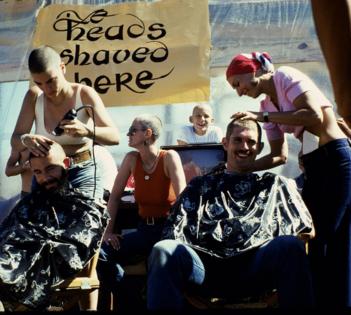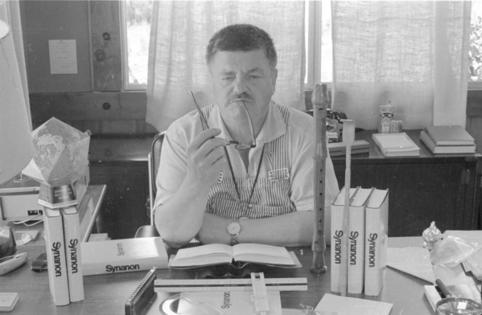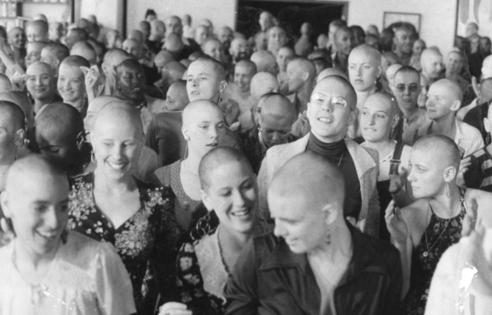'The Synanon Fix' shows how the California dream went awry for a rehab group turned cult
Published in Entertainment News
LOS ANGELES — In the late 1950s, Charles "Chuck" Dederich started a drug rehabilitation program out of a storefront in Santa Monica. A recovering alcoholic who'd gotten sober through Alcoholics Anonymous, Dederich offered free treatment to self-described "dope fiends" desperate to kick their deadly habit and go cold turkey.
Over the next decade and a half, the group, named Synanon, expanded across the country and evolved into a self-help movement with thousands of members, including many who were not addicts but were simply drawn to its idealistic vision — no drugs, alcohol, or violence — and its primary ritual, an intensely confrontational form of group therapy known as "The Game."
Yet by the late 1970s, Synanon had strayed dramatically from its original mission, devolving into a dangerous quasi-religious paramilitary organization whose devotees, beholden to Dederich's increasingly erratic whims, were willing to undergo forced vasectomies, relinquish control over their own children and even attempt to murder a prominent critic by planting a rattlesnake in his mailbox.
The dark saga of Synanon is now the subject of a four-part documentary "The Synanon Fix," which concluded Monday on HBO. Directed and executive produced by Rory Kennedy, the series traces the group's utopian origins and gradual descent into violence and manipulation. Arriving at a moment when the public's interest in cults and high-control groups seems almost insatiable, "The Synanon Fix" offers a particularly grim, resonant twist on the familiar tale of the California dream gone awry.
The story "had this really dramatic, almost Shakespearean arc to it," said writer and executive producer Mark Bailey, in a video chat with Kennedy from their home in California (the couple are filmmaking partners and have also been married since 1999). "The intentions and accomplishments for the first decade or so were really amazing. But where it ended up was really dark and destructive."
Kennedy, who has made more than a dozen documentaries including "Ghosts of Abu Ghraib" and "Downfall: The Case Against Boeing," said she was not particularly interested in "quote-unquote cult stories," but was struck by the drama of Synanon's 180-degree transformation. "In the beginning the pillars of Synanon were no drugs, no alcohol and no violence. By the end, they had bought more firearms than anybody in the history of California and had an open bar in the facility."
Not only was the story dramatic, but it contained lessons about the dangers of blindly following a charismatic leader — a topic that feels politically relevant in 2024. Dederich was just such a figure, someone who built a community and inspired intense loyalty from his followers. "Because they're tethered to him, where he goes, they go. And that's the danger — as he starts becoming less stable, whether it's from his alcoholism or mental illness, he takes Synanon with it," Bailey said. "That felt, to us, like an important thing to say right now." (Along with many members of her famous family, Kennedy, whose brother Robert F. Kennedy Jr. is running for president as an independent, endorsed President Joe Biden last week.)
Kennedy and Bailey first learned about Synanon about a decade ago while reading "Straight Life," an autobiography by jazz musician Art Pepper and his wife, Laurie, who met while getting clean in Synanon. "I had never heard of Synanon, but it's right there on the beach, these folks with shaved heads, playing 'The Game,' which sounds like this pretty radical therapeutic treatment," Bailey said. "I was instantly like, 'Wow, what was this? And why have I never heard about it?'"
The documentary is woven together using extensive archival material — including news reports and visceral footage of members playing "The Game," in which participants were aggressively pushed to be brutally honest about themselves and each other. It also features audio recordings of Dederich lecturing his followers over "the Wire," the group's internal broadcasting system, as well as first-person accounts from roughly 20 former members and interviews with journalists including Narda Zacchino, who wrote about Synanon for The Times.
Some former members were initially wary of sitting for interviews, Kennedy said, because "everybody was aware that there was a way to tell this story that's pretty sensationalist." But as she gradually won them over, more people decided to participate in the documentary — including Dederich's daughter, Jady Dederich Montgomery.
...continued
©2024 Los Angeles Times. Visit latimes.com. Distributed by Tribune Content Agency, LLC.












Comments